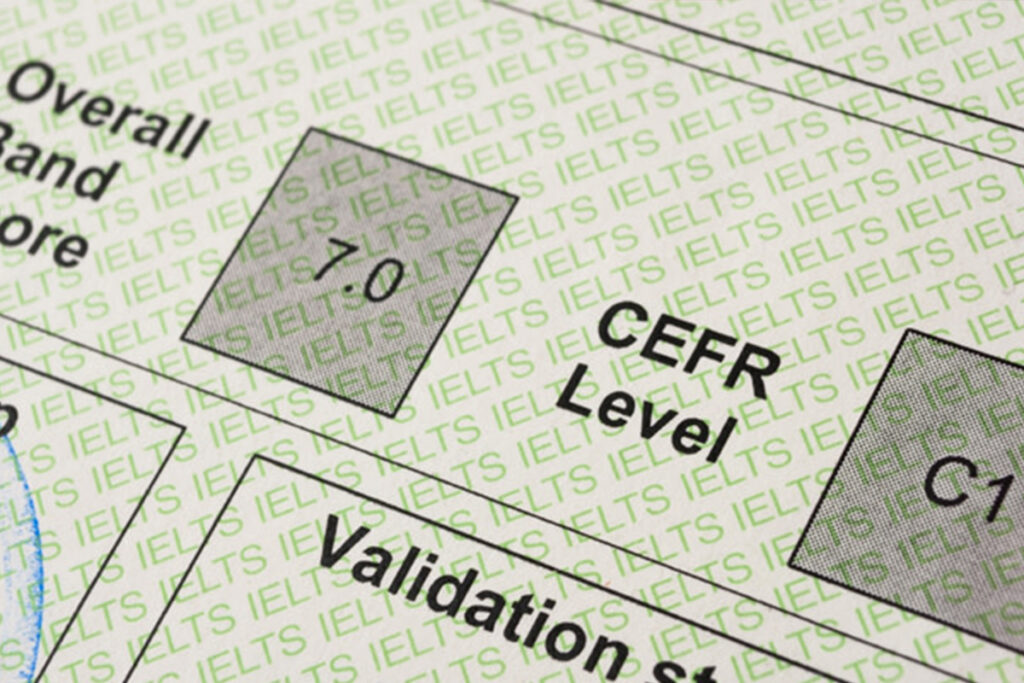
The IELTS Speaking band score evaluates your ability to communicate effectively in English. During the test, the examiner assigns a speaking band score based on your spoken English proficiency. The test is conducted in a face-to-face interview with a certified IELTS examiner in a quiet setting.
Trained and certified examiners conduct the IELTS Speaking test, ensuring they have the necessary qualifications and experience. They follow clearly defined IELTS speaking marking criteria when assessing your performance.
Your performance is assessed across four main criteria: fluency and coherence, lexical resource, grammatical range and accuracy, and pronunciation. Based on these, you will receive a speaking band score, ranging from 0 to 9, with each score representing a specific level of English proficiency.
For more details on the assessment standards used by IELTS examiners, you can refer to the IELTS Speaking public band descriptors available online.

IELTS Speaking band scores
BAND 0
A IELTS Speaking band score of 0 under the IELTS speaking marking criteria is given when the candidate does not attend the test. This means there is no performance to assess for fluency and coherence, lexical resource, grammatical range and accuracy, or pronunciation, and therefore no speaking band score can be awarded.
BAND 1
A IELTS Speaking band score of 1 indicates that no meaningful communication is possible during the test. Under the IELTS speaking marking criteria, this means the candidate shows no rateable language across all areas such as fluency and coherence, lexical resource, grammatical range and accuracy, and pronunciation. At speaking band score 1, the speaker is unable to produce any understandable or relevant language, making assessment impossible in every category.
BAND 2
A IELTS Speaking band score of 2 reflects extremely limited ability under the IELTS speaking marking criteria. The candidate shows fluency and coherence marked by long pauses before most words, making only minimal communication possible. Their speaking band score also reflects a lexical resource limited to isolated words or memorised phrases, inability to form basic sentences, and pronunciation that is often unintelligible, severely hindering understanding.
BAND 3
A IELTS Speaking band score of 3 under the IELTS speaking marking criteria means the speaker gives simple responses with long pauses, uses limited vocabulary, makes frequent grammar errors, and relies on memorised phrases. Pronunciation shows some features of band 2 and a few positives from band 4, but overall communication remains very limited.
BAND 4
A IELTS Speaking band score of 4 shows limited ability. The speaker pauses often, uses basic vocabulary and grammar with frequent errors, and struggles with unfamiliar topics. As per the IELTS speaking marking criteria, pronunciation issues and lack of coherence make communication difficult.
BAND 5
A IELTS Speaking band score of 5 reflects partial fluency. The speaker maintains speech flow but relies on repetition and slow speech. Vocabulary use is limited in flexibility, and paraphrasing attempts may not always succeed. According to the IELTS speaking marking criteria, grammar includes mostly basic forms with some errors in complex structures. Pronunciation shows improvement over Band 4 but still lacks full clarity.
BAND 6
A IELTS Speaking band score of 6 indicates the speaker is willing to speak at length and uses a range of connectives, though occasional repetition or hesitation may affect fluency and coherence. Vocabulary is generally sufficient for extended discussion, with mostly successful paraphrasing, aligning with the IELTS speaking marking criteria. Grammar shows a mix of simple and complex structures, though errors occur, especially in complex forms. Pronunciation is mostly clear, though some mispronunciations may reduce the clarity.
BAND 7
A IELTS Speaking band score of 7 reflects strong performance across the IELTS speaking marking criteria. The speaker maintains fluency and coherence, speaking at length with minimal effort and only occasional hesitation or self-correction. They use a wide vocabulary flexibly, including less common and idiomatic expressions, though with some inappropriate choices. Grammar includes frequent error-free complex structures, with only occasional mistakes. Pronunciation is generally clear and incorporates features from both Band 6 and Band 8.
BAND 8
An IELTS Speaking band score of 8 reflects strong performance across all IELTS speaking marking criteria. The speaker is fluent, with rare hesitation and well-developed ideas. Vocabulary is broad and includes idiomatic language, used effectively with minimal errors. Grammar is varied and mostly error-free. Pronunciation is clear and flexible, with minimal influence from their first language.
BAND 9
An IELTS Speaking band score of 9 indicates fluency with rare repetition or self-correction, and hesitation is only content-related. The speaker develops topics fully, using cohesive features appropriately. Vocabulary is precise and flexible, with accurate idiomatic language. Grammar is varied and accurate, with minimal errors. Pronunciation is clear and precise, making the speaker easy to understand.
To achieve a high IELTS Speaking band score, focus on developing fluency, coherence, lexical resource, grammatical range, and pronunciation. Practice speaking regularly for clear and coherent responses, and expand your vocabulary to express ideas precisely. Use a variety of sentence structures and ensure accuracy, particularly with complex sentences. Pay attention to pronunciation, striving for clarity while using a range of features effectively. Lastly, familiarize yourself with the IELTS Speaking marking criteria to better understand the expectations and improve your performance across all areas. Consistent practice and constructive feedback are key to securing a high band score.
To Know more and improve your IELTS Speaking skills, click here.
Also Check out details on BLS & ACLS training in Kuwait.
Salmiya : REG IMMIGRATION AND EDUCATION
2nd Floor, Building No.44, Yusuf, Yousef Al Bader St, Salmiya.
Jaleeb Al Shuyoukh :
Building No. 146
Floor 2, Street 6,
Block 4, Near Subway,
Jaleeb Al-Shuyoukh
Mangaf : 1st floor Building number 90
Street number 25
Mangaf block 4
Near Green Asia supermarket
Copyright © 2025 REG EDUCATION AND IMMIGRATION. All rights reserved. Powered by Zeekoi Enterprise Solutions